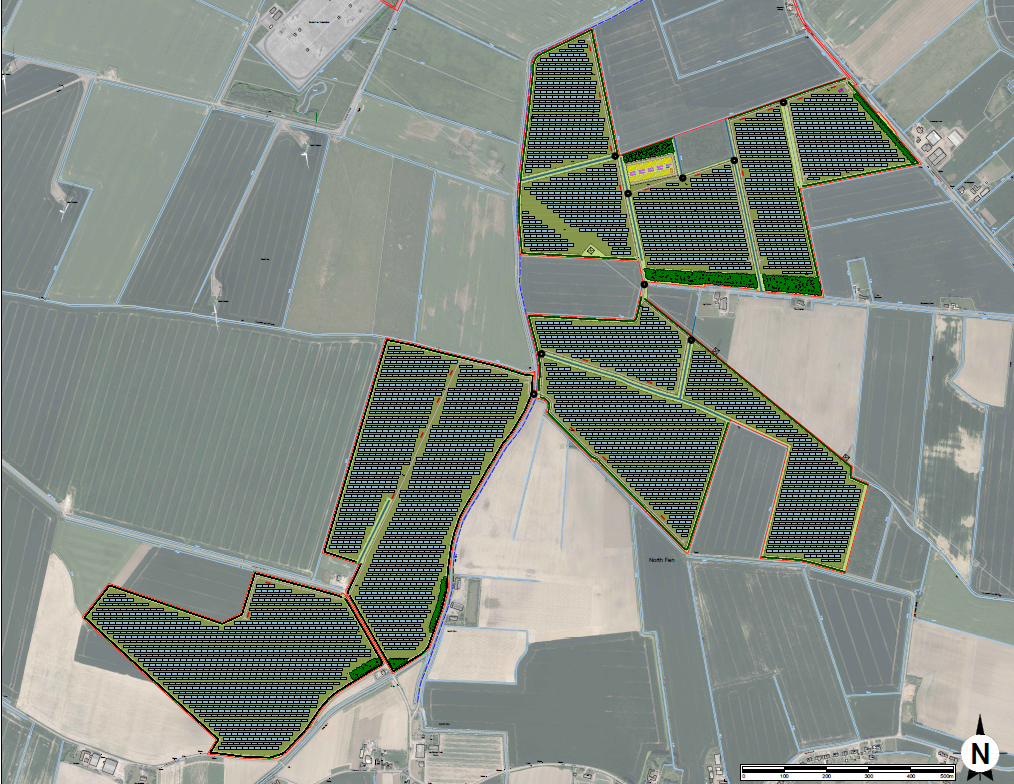
A 15-year renewable energy agreement announced today (27 November 2024) will enable the Council to cut its greenhouse gas emissions, save money and protect against future price rises.
The Council is entering into a virtual Power Purchase Agreement (vPPA) with AGR Power under which it will buy its electricity at a fixed price directly from a new solar farm development. AGR will own and operate the facility.
While vPPAs are a tried-and-tested model, the Council will be one of the first local authorities in the UK to enter into one.
This will save an estimated 20,000 tonnes of carbon emissions over the first five years as well as delivering significant savings on energy costs.
The Council’s long-term commitment will enable the construction and operation of a new solar farm at Bicker Fen near Boston in Lincolnshire, contributing new genuinely ‘green’ energy to the National Grid. The 97.3-hectare site already has planning permission and construction is underway, with the vPPA due to go live by September 2025.
AGR Power, founded in 2011, has successfully delivered more than 1.1 gigawatts of renewable energy projects in the UK, saving more than 350,000 tonnes of carbon emissions. This project in particular is the first of AGR’s wider portfolio of 200MW+ solar projects which the company is planning to operate and construct by 2026. AGR’s efforts are supported by its co-owner Railpen, one of the largest pension managers in the UK, responsible for managing £34 billion of assets on behalf of over 350,000 members.
As part of the vPPA deal, AGR has committed to delivering social value benefits in Manchester, including supporting the We Love Manchester charity in its work with young people in the City through its Rising Stars Fund which helps ambitious 15 to 22-year-olds facing financial barriers to take their next step in work, qualifications or entrepreneurship, and their Protecting and Improving Open Spaces work which empowers local people in Manchester to improve their own communities and spaces.
The Council is currently developing its Climate Change Action Plan for 2025-30, setting out how the council will build on the achievements of the current 2020-25 plan and continue to reduce its emissions. The vPPA will be a core part of this.
The Climate Change Action Plan sets out how the Council will meet its organisational goal of becoming zero carbon by 2038, in line with the wider city target and influence others to reduce their carbon emissions. While it is currently on track to meet its organisational reduction target for 2020-25, staying on the right reduction path from 2025 onwards is only possible through greater involvement in renewable energy generation.
The Council has explored various options to meet its renewable energy supply requirements.
The Council’s independent advisers, including the Tyndall Centre for Climate Research and Ernst & Young, have confirmed that the purchase of a vPPA is a valid and indeed essential contribution towards meeting the Council’s zero carbon targets through creating new sustainable energy.
The vPPA will provide up to 35GWh per year of the Council’s electricity requirements for running its buildings, other assets such as street lighting and electric vehicles – meeting the vast majority of the authority’s electricity supply needs over its term.
Councillor Tracey Rawlins, Executive Member for Environment, said: “This is a milestone agreement which has taken a huge amount of work to conclude.
“It’s good for the Council and Manchester people – saving money and improving our energy security – and crucially it’s good for the planet at the same time, enabling us to save more than 20,000 tonnes of harmful carbon emissions. I also welcome the fact that AGR Power have embraced our requirement that council spending generates extra benefits for Manchester people.”
Oliver Breidt, AGR Renewables Founder, said: “AGR is incredibly proud to work with Manchester City Council on a landmark agreement to support the decarbonisation of one of UK’s largest cities and providing support to local communities. The agreement is an important cornerstone in our own development to become a key power provider to UK cities, councils, and businesses, which are committed to reducing their energy costs and carbon footprint.”


